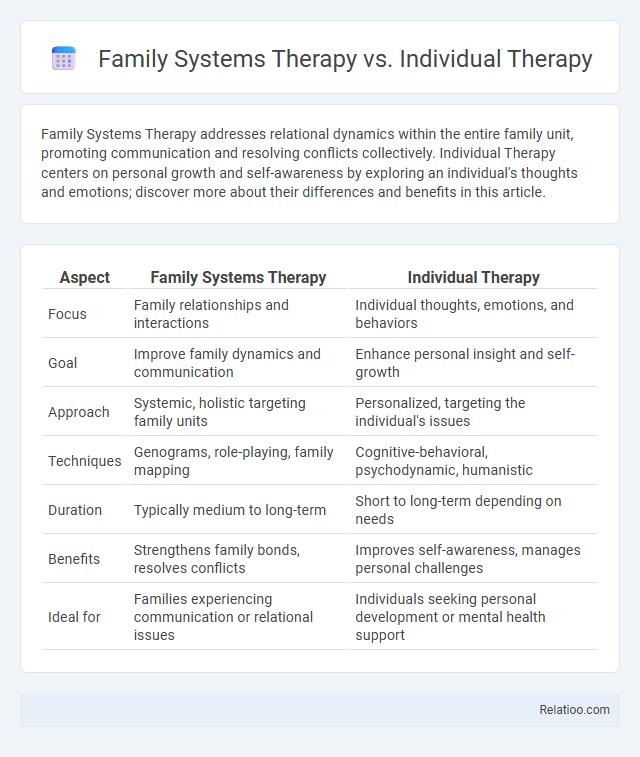Family Systems Therapy addresses relational dynamics within the entire family unit, promoting communication and resolving conflicts collectively. Individual Therapy centers on personal growth and self-awareness by exploring an individual's thoughts and emotions; discover more about their differences and benefits in this article.
Table of Comparison
| Aspect | Family Systems Therapy | Individual Therapy |
|---|---|---|
| Focus | Family relationships and interactions | Individual thoughts, emotions, and behaviors |
| Goal | Improve family dynamics and communication | Enhance personal insight and self-growth |
| Approach | Systemic, holistic targeting family units | Personalized, targeting the individual's issues |
| Techniques | Genograms, role-playing, family mapping | Cognitive-behavioral, psychodynamic, humanistic |
| Duration | Typically medium to long-term | Short to long-term depending on needs |
| Benefits | Strengthens family bonds, resolves conflicts | Improves self-awareness, manages personal challenges |
| Ideal for | Families experiencing communication or relational issues | Individuals seeking personal development or mental health support |
Understanding Family Systems Therapy
Family Systems Therapy emphasizes the interconnections and patterns within the entire family unit, recognizing how each member influences and is influenced by others. Unlike Individual Therapy, which focuses on personal issues in isolation, Family Systems Therapy addresses collective dynamics to promote healthier relationships and communication. Your healing process benefits from this holistic approach by uncovering underlying family roles, boundaries, and interactions that shape behavior.
What is Individual Therapy?
Individual therapy, a cornerstone of mental health treatment, focuses on one-on-one sessions between a client and therapist to address personal challenges and promote self-awareness. Unlike family systems therapy or family therapy, which explore relational dynamics within the family unit, individual therapy emphasizes personal growth, coping mechanisms, and emotional healing tailored to the individual's unique experiences. This approach utilizes techniques such as cognitive-behavioral therapy (CBT), psychodynamic therapy, and humanistic methods to foster insight and behavioral change.
Core Principles of Family Systems Therapy
Family Systems Therapy centers on the belief that individuals are best understood through their relationships within the family unit, emphasizing patterns of interaction and communication. It views the family as an emotional system where each member's behavior affects and is affected by others, highlighting concepts like boundaries, roles, and homeostasis. Your progress in therapy can benefit from exploring these systemic dynamics, contrasting with Individual Therapy's focus on personal issues and Family Therapy's broader approach without the deep systemic analysis.
Key Components of Individual Therapy
Individual Therapy centers on personalized goals, emphasizing self-awareness, emotional regulation, and cognitive restructuring within a confidential one-on-one setting. Techniques typically involve exploration of personal history, behavior patterns, and thought processes to address specific psychological issues. This contrasts with Family Systems Therapy and Family Therapy, which primarily focus on relational dynamics, communication patterns, and systemic interactions among family members.
Goals and Objectives of Each Approach
Family Systems Therapy aims to identify and modify dysfunctional patterns within the family unit, promoting healthier communication and relationships through systemic interventions. Individual Therapy focuses on personal growth, emotional regulation, and resolving intrapersonal conflicts by addressing the client's unique thoughts, feelings, and behaviors. Family Therapy broadly targets improving family dynamics and support structures, seeking to enhance collaboration and problem-solving among family members for collective well-being.
Situations Best Suited for Family Systems Therapy
Family Systems Therapy is best suited for situations involving complex relational patterns and dynamics within family units, such as conflicts between multiple members, generational trauma, or issues where individual behaviors are deeply intertwined with family roles. Your therapist will focus on improving communication, resolving systemic issues, and fostering healthier interactions across the family network rather than addressing problems in isolation. This approach is particularly effective when mindful interventions require understanding the family as an emotional system rather than treating individuals separately.
When to Choose Individual Therapy
Individual therapy is most effective when You seek personal insight, emotional healing, or behavior change without the influence of family dynamics. This approach targets Your specific mental health goals, focusing on self-exploration, coping strategies, and individual challenges such as anxiety or depression. Family systems therapy and family therapy are better suited when relational patterns or collective family issues need to be addressed.
Comparing Effectiveness: Family vs. Individual Therapy
Family systems therapy offers a holistic approach by addressing relational dynamics and communication patterns within the family unit, often leading to more sustained improvements in emotional well-being and conflict resolution. Individual therapy focuses exclusively on personal issues, which can be effective for self-awareness but may overlook the broader family context influencing behavior. Your choice depends on whether resolving systemic family issues or personal growth is the primary goal, with research indicating family therapy tends to yield better outcomes for relational problems.
Challenges and Limitations of Both Modalities
Family Systems Therapy faces challenges such as navigating complex dynamics and resistance from multiple family members, which can slow progress and require skilled facilitation. Individual Therapy may limit insight into relational issues by focusing primarily on your personal experiences and emotions without addressing broader family patterns. Family Therapy often struggles with managing conflicting agendas and power imbalances within the family, making it difficult to achieve consensus or lasting change.
Making the Right Choice for Your Mental Health
Choosing between Family Systems Therapy, Individual Therapy, and Family Therapy depends on your specific mental health needs and relationship dynamics. Family Systems Therapy examines patterns and interactions within the entire family unit to address collective issues, while Individual Therapy focuses on personal challenges, emotions, and behavioral change. Family Therapy emphasizes improving communication and resolving conflicts among family members, making the right choice critical for targeted and effective mental health treatment.

Infographic: Family Systems Therapy vs Individual Therapy
 relatioo.com
relatioo.com